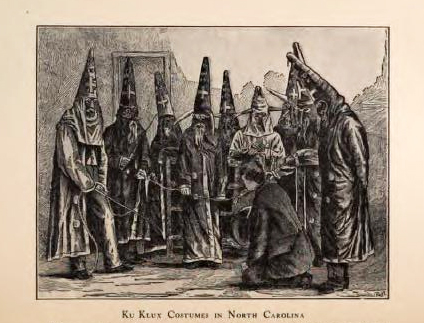27 June 1833–29 July 1890
Frederick Nash Strudwick, lawyer and legislator, was born in Hillsborough, Orange County, one of three sons of Dr. Edmund and Ann Nash Strudwick. His father, a well-known physician, helped reestablish and served as first president of the North Carolina Medical Society. Strudwick's grandfather was Francis Nash, a jurist and member of the North Carolina Supreme Court. After schooling in Hillsborough Frederick attended The University of North Carolina, graduating in 1851. He then began a law practice in Hillsborough. On 27 July 1854 he married Mary S. Burwell of Hillsborough, and they had one son, Robert C. Mary died on 3 July 1859 after a long illness. Strudwick later married Rosa Spottswood, and they had one child, Anne.
During Reconstruction Strudwick became active in the Ku Klux Klan in Orange County. Around Christmas in 1869 he organized and led a group of Klansmen who attempted to assassinate Alamance County Republican state senator T. M. Shoffner, who had introduced legislation aimed at curbing Ku Klux Klan activity. The plot failed when a group of Klansmen opposed to the assassination, hearing the news that Shoffner was in Greensboro, intercepted Strudwick and his men at the Orange-Alamance County line and induced them to turn back.

In February 1870 Strudwick, a Democrat, was chosen to fill the unexpired term of J. J. Allison in the North Carolina House of Representatives. He was elected to a full two-year term in August 1870. In Raleigh his most notable action was presenting the motion to impeach Governor W. W. Holden for having called out the militia against the Ku Klux Klan. Following several meetings with Conservative leaders he introduced the impeachment resolution on 9 Dec. 1870. Strudwick was a central figure in guiding the measure through the house judiciary committee and the full house. He was not chosen as a manager for the subsequent senate trial, however, because it was feared that his widely known association with the Ku Klux Klan might make the impeachment proceedings appear to be a Klan prosecution.
After his service in the house Strudwick became solicitor for the Fifth District, a position he held until his voluntary retirement eight years later. On 11 Aug. 1887 he and C. E. Parish became co-owners and editors of the Hillsborough Recorder. In their first issue they stated their editorial philosophy as "a firm and conservative stand on all matters affecting the public welfare." They went on to say "that this paper upon all questions of politics will be thoroughly Democratic, but upon all things else, temperate." He left the Recorder after the 8 Mar. 1888 issue.
A member of the Presbyterian church, Strudwick died after an illness of several months and was buried in the Hillsborough Cemetery. A special town meeting, led by C. E. Parish, was convened in his honor. He was survived by his second wife and both children.